Li-Wen Chang
R-KV: Redundancy-aware KV Cache Compression for Training-Free Reasoning Models Acceleration
May 30, 2025Abstract:Reasoning models have demonstrated impressive performance in self-reflection and chain-of-thought reasoning. However, they often produce excessively long outputs, leading to prohibitively large key-value (KV) caches during inference. While chain-of-thought inference significantly improves performance on complex reasoning tasks, it can also lead to reasoning failures when deployed with existing KV cache compression approaches. To address this, we propose Redundancy-aware KV Cache Compression for Reasoning models (R-KV), a novel method specifically targeting redundant tokens in reasoning models. Our method preserves nearly 100% of the full KV cache performance using only 10% of the KV cache, substantially outperforming existing KV cache baselines, which reach only 60% of the performance. Remarkably, R-KV even achieves 105% of full KV cache performance with 16% of the KV cache. This KV-cache reduction also leads to a 90% memory saving and a 6.6X throughput over standard chain-of-thought reasoning inference. Experimental results show that R-KV consistently outperforms existing KV cache compression baselines across two mathematical reasoning datasets.
MegaScale-Infer: Serving Mixture-of-Experts at Scale with Disaggregated Expert Parallelism
Apr 03, 2025



Abstract:Mixture-of-Experts (MoE) showcases tremendous potential to scale large language models (LLMs) with enhanced performance and reduced computational complexity. However, its sparsely activated architecture shifts feed-forward networks (FFNs) from being compute-intensive to memory-intensive during inference, leading to substantially lower GPU utilization and increased operational costs. We present MegaScale-Infer, an efficient and cost-effective system for serving large-scale MoE models. MegaScale-Infer disaggregates attention and FFN modules within each model layer, enabling independent scaling, tailored parallelism strategies, and heterogeneous deployment for both modules. To fully exploit disaggregation in the presence of MoE's sparsity, MegaScale-Infer introduces ping-pong pipeline parallelism, which partitions a request batch into micro-batches and shuttles them between attention and FFNs for inference. Combined with distinct model parallelism for each module, MegaScale-Infer effectively hides communication overhead and maximizes GPU utilization. To adapt to disaggregated attention and FFN modules and minimize data transmission overhead (e.g., token dispatch), MegaScale-Infer provides a high-performance M2N communication library that eliminates unnecessary GPU-to-CPU data copies, group initialization overhead, and GPU synchronization. Experimental results indicate that MegaScale-Infer achieves up to 1.90x higher per-GPU throughput than state-of-the-art solutions.
Comet: Fine-grained Computation-communication Overlapping for Mixture-of-Experts
Feb 27, 2025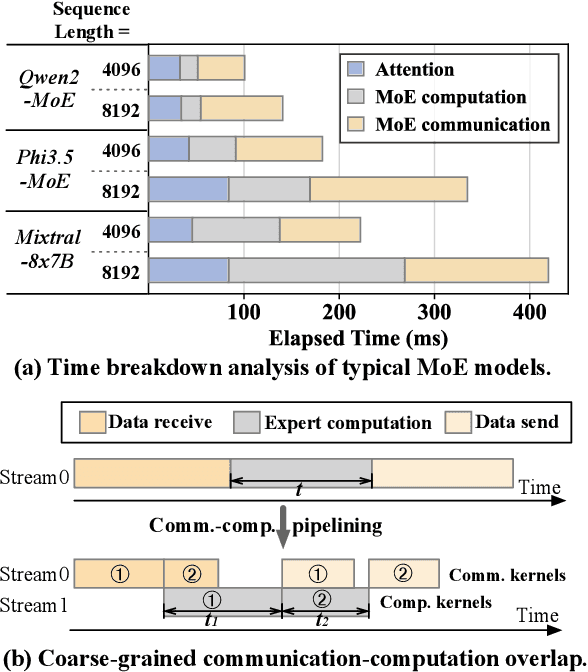



Abstract:Mixture-of-experts (MoE) has been extensively employed to scale large language models to trillion-plus parameters while maintaining a fixed computational cost. The development of large MoE models in the distributed scenario encounters the problem of large communication overhead. The inter-device communication of a MoE layer can occupy 47% time of the entire model execution with popular models and frameworks. Therefore, existing methods suggest the communication in a MoE layer to be pipelined with the computation for overlapping. However, these coarse grained overlapping schemes introduce a notable impairment of computational efficiency and the latency concealing is sub-optimal. To this end, we present COMET, an optimized MoE system with fine-grained communication-computation overlapping. Leveraging data dependency analysis and task rescheduling, COMET achieves precise fine-grained overlapping of communication and computation. Through adaptive workload assignment, COMET effectively eliminates fine-grained communication bottlenecks and enhances its adaptability across various scenarios. Our evaluation shows that COMET accelerates the execution of a single MoE layer by $1.96\times$ and for end-to-end execution, COMET delivers a $1.71\times$ speedup on average. COMET has been adopted in the production environment of clusters with ten-thousand-scale of GPUs, achieving savings of millions of GPU hours.
ShadowKV: KV Cache in Shadows for High-Throughput Long-Context LLM Inference
Oct 28, 2024Abstract:With the widespread deployment of long-context large language models (LLMs), there has been a growing demand for efficient support of high-throughput inference. However, as the key-value (KV) cache expands with the sequence length, the increasing memory footprint and the need to access it for each token generation both result in low throughput when serving long-context LLMs. While various dynamic sparse attention methods have been proposed to speed up inference while maintaining generation quality, they either fail to sufficiently reduce GPU memory consumption or introduce significant decoding latency by offloading the KV cache to the CPU. We present ShadowKV, a high-throughput long-context LLM inference system that stores the low-rank key cache and offloads the value cache to reduce the memory footprint for larger batch sizes and longer sequences. To minimize decoding latency, ShadowKV employs an accurate KV selection strategy that reconstructs minimal sparse KV pairs on-the-fly. By evaluating ShadowKV on a broad range of benchmarks, including RULER, LongBench, and Needle In A Haystack, and models like Llama-3.1-8B, Llama-3-8B-1M, GLM-4-9B-1M, Yi-9B-200K, Phi-3-Mini-128K, and Qwen2-7B-128K, we demonstrate that it can support up to 6$\times$ larger batch sizes and boost throughput by up to 3.04$\times$ on an A100 GPU without sacrificing accuracy, even surpassing the performance achievable with infinite batch size under the assumption of infinite GPU memory. The code is available at https://github.com/bytedance/ShadowKV.
NGEMM: Optimizing GEMM for Deep Learning via Compiler-based Techniques
Nov 13, 2019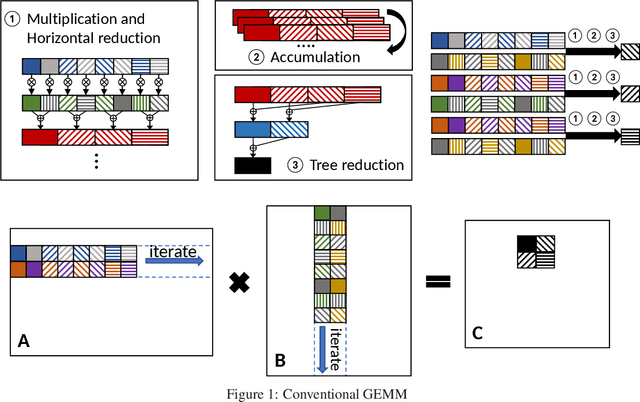
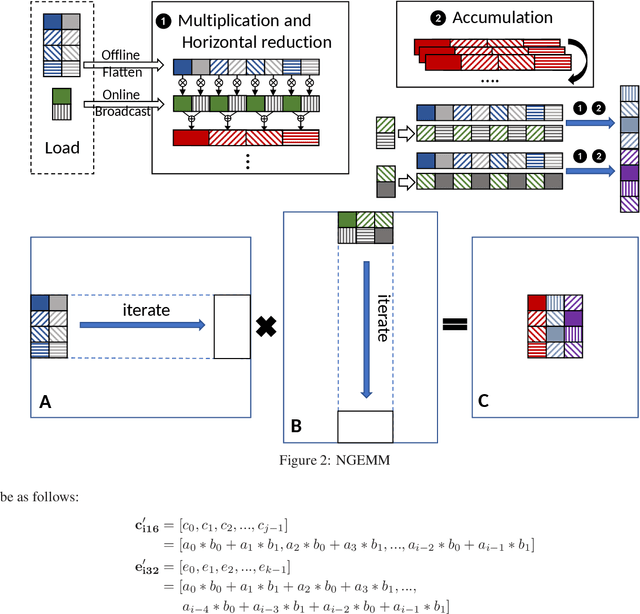
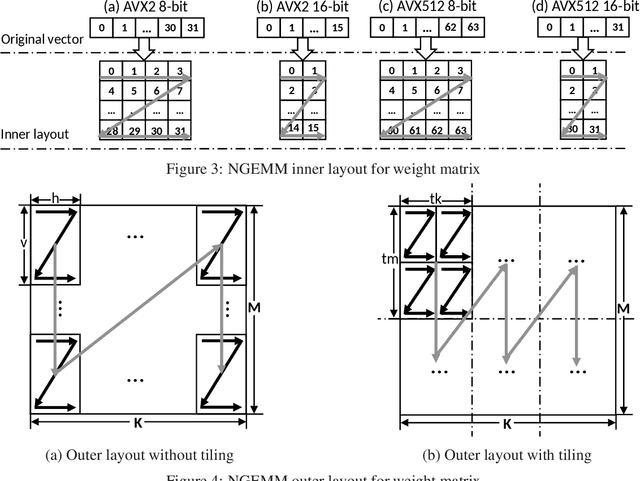
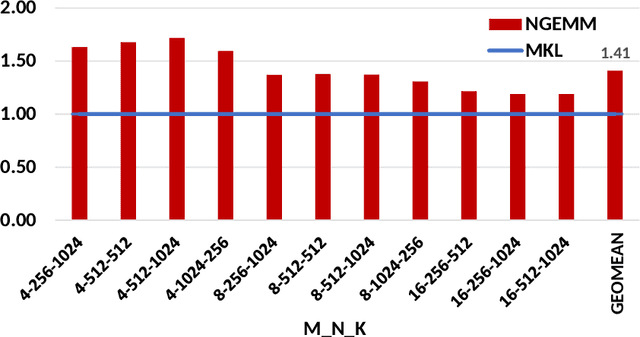
Abstract:Quantization has emerged to be an effective way to significantly boost the performance of deep neural networks (DNNs) by utilizing low-bit computations. Despite having lower numerical precision, quantized DNNs are able to reduce both memory bandwidth and computation cycles with little losses of accuracy. Integer GEMM (General Matrix Multiplication) is critical to running quantized DNN models efficiently, as GEMM operations often dominate the computations in these models. Various approaches have been developed by leveraging techniques such as vectorization and memory layout to improve the performance of integer GEMM. However, these existing approaches are not fast enough in certain scenarios. We developed NGEMM, a compiler-based GEMM implementation for accelerating lower-precision training and inference. NGEMM has better use of the vector units by avoiding unnecessary vector computation that is introduced during tree reduction. We compared NGEMM's performance with the state-of-art BLAS libraries such as MKL. Our experimental results showed that NGEMM outperformed MKL non-pack and pack version by an average of 1.86x and 1.16x, respectively. We have applied NGEMM to a number of production services in Microsoft.
 Add to Chrome
Add to Chrome Add to Firefox
Add to Firefox Add to Edge
Add to Edge